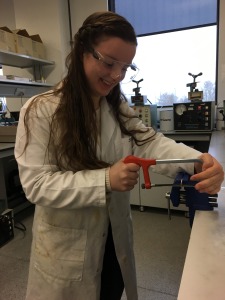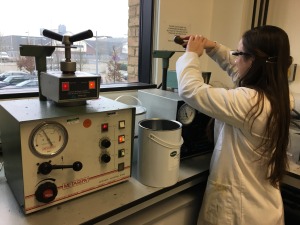 Materials Science for me was a good middle ground between engineering and “pure” science, as it lies at the boundaries between chemistry, physics, and engineering. It is a very directly applied science, featuring in all aspects of technology from mobile phones to buildings, weighing scales to kettles… everything is made of a material, and that material has been chosen for specific properties that allow the final product to operate as it does. I particularly love my practical sessions in the lab, where I get to use incredibly powerful microscopes (for example, a Scanning Electron Microscope, which magnifies up to 300,000 times!) to observe microstructures of materials, and see how that affects its properties. I also occasionally get to smash things! When I was applying to university, I knew that I wanted to eventually end up, somehow, in the renewable energy industry. There were a lot of paths that I could have chosen to take, and I considered a variety of options. Eventually I decided I would apply to Cambridge’s Natural Science course. The breadth of the course in first year allowed me more time to decide what I wanted to focus on- there was even the possibility of changing to Chemical Engineering in second year. Now that I am in second year, I am very happy to be studying Materials Science and Chemistry.
Materials Science for me was a good middle ground between engineering and “pure” science, as it lies at the boundaries between chemistry, physics, and engineering. It is a very directly applied science, featuring in all aspects of technology from mobile phones to buildings, weighing scales to kettles… everything is made of a material, and that material has been chosen for specific properties that allow the final product to operate as it does. I particularly love my practical sessions in the lab, where I get to use incredibly powerful microscopes (for example, a Scanning Electron Microscope, which magnifies up to 300,000 times!) to observe microstructures of materials, and see how that affects its properties. I also occasionally get to smash things! When I was applying to university, I knew that I wanted to eventually end up, somehow, in the renewable energy industry. There were a lot of paths that I could have chosen to take, and I considered a variety of options. Eventually I decided I would apply to Cambridge’s Natural Science course. The breadth of the course in first year allowed me more time to decide what I wanted to focus on- there was even the possibility of changing to Chemical Engineering in second year. Now that I am in second year, I am very happy to be studying Materials Science and Chemistry.
Since studying Material Science, I have become more aware about how processes are energy intensive and how developers don’t necessarily consider the sustainability of the process or product.
This has become an area of science I want to research more into, and has encouraged me to look beyond university to organisations that are undertaking this work. One such example of this is the Ellen MacArthur Foundation, which is working towards the idea of a “Circular Economy”. A different route I am considering is that of independent energy suppliers, who tend to be making a much greater effort than the “Big Six” energy suppliers to invest in renewable energy. The exploration of these paths would not have occurred to me if I hadn’t chosen to study my degree course.
Studying a science degree, and being continually encouraged to question “Why?” to every next discovery or piece of understanding, spills over into my everyday life, and opens up a new way of thinking.
 The best part of a science degree is how many doors it opens for you. You are not restricted to a life of research and academia. There are many opportunities in industry but you can go far beyond this too; charities, investment, law, the possibilities are endless. A science degree provides you with the ability to take apart any problem in a logical, objective and analytical way, and find an effective solution.
The best part of a science degree is how many doors it opens for you. You are not restricted to a life of research and academia. There are many opportunities in industry but you can go far beyond this too; charities, investment, law, the possibilities are endless. A science degree provides you with the ability to take apart any problem in a logical, objective and analytical way, and find an effective solution.
Daniella Sauven
Undergraduate student